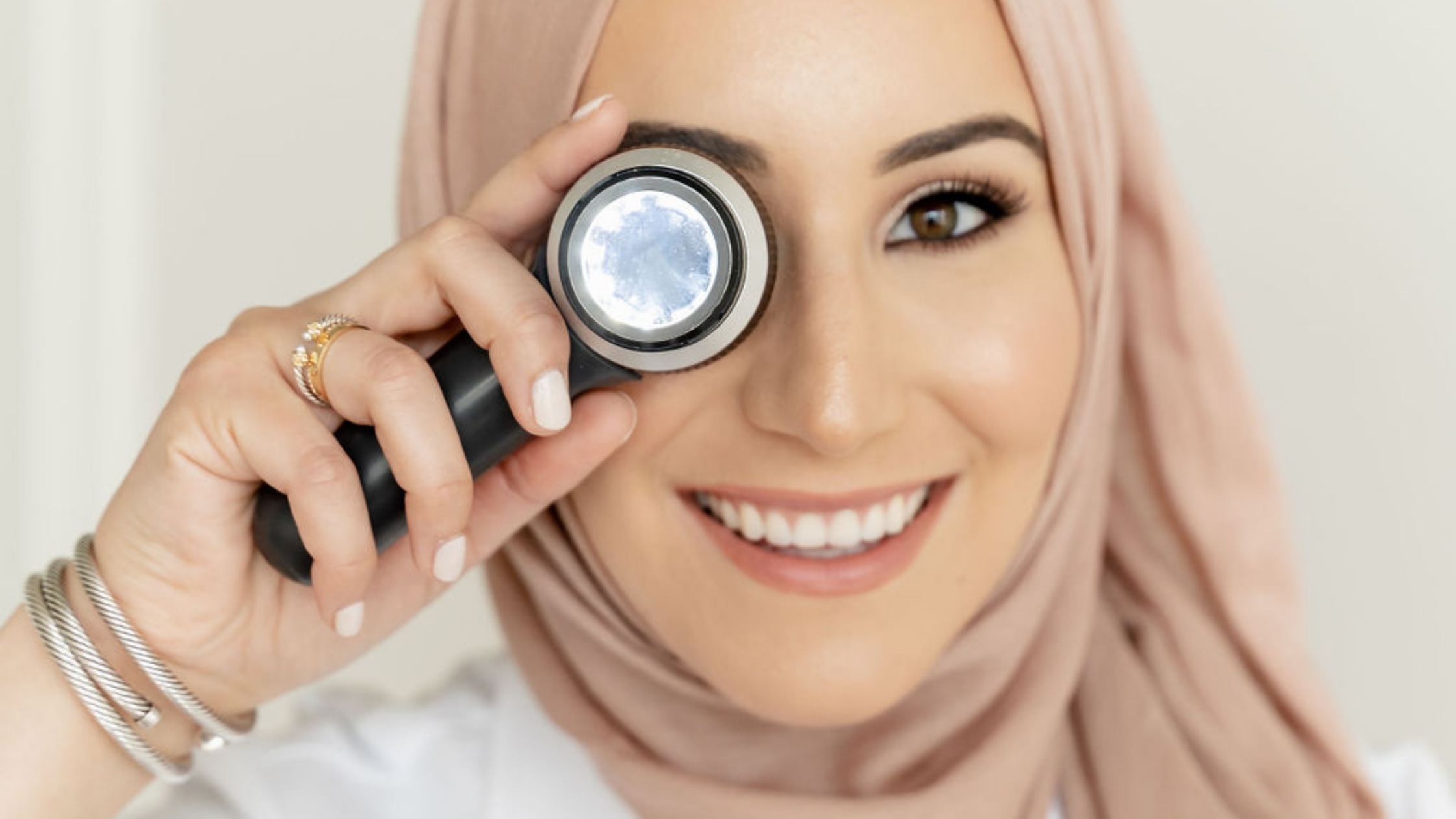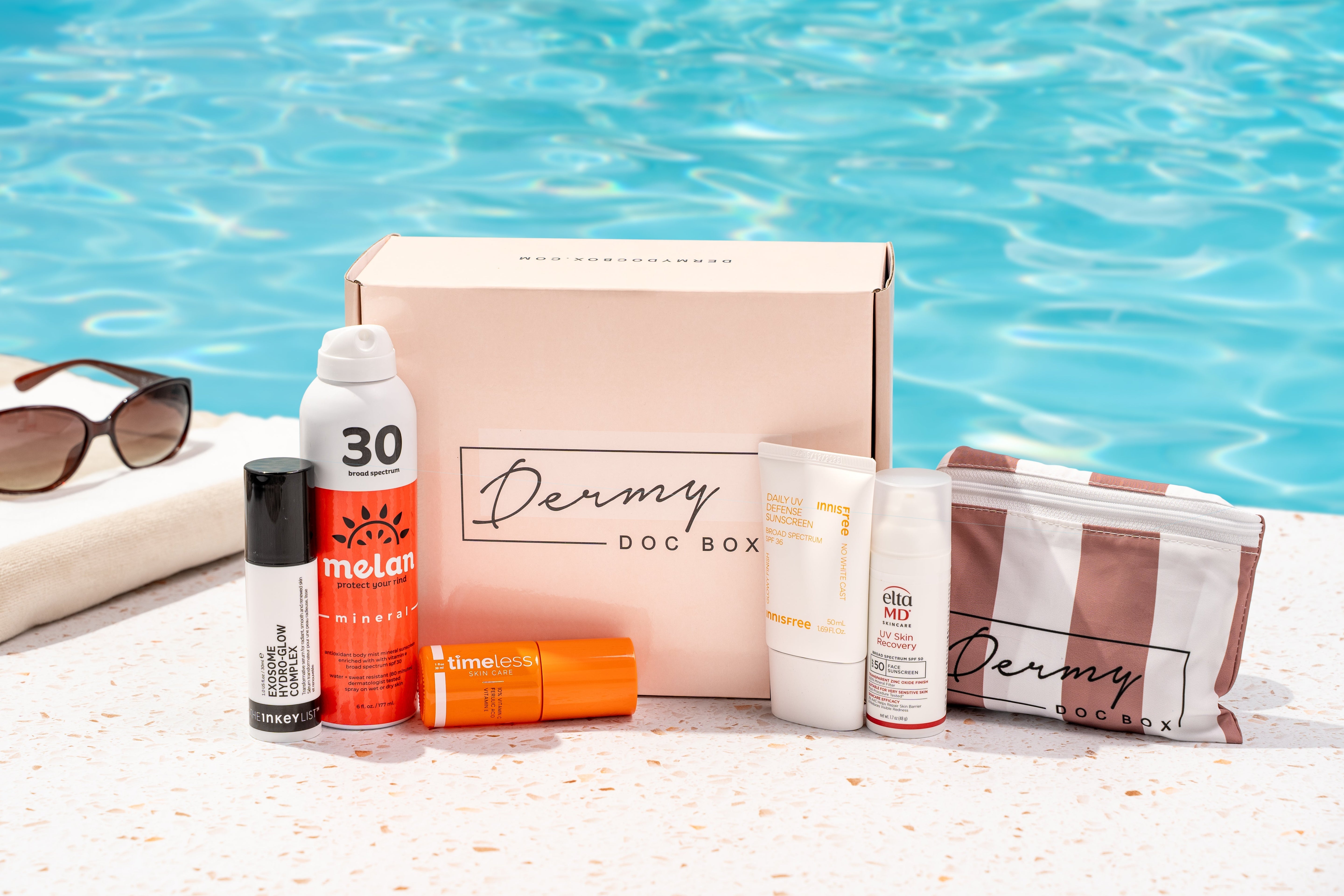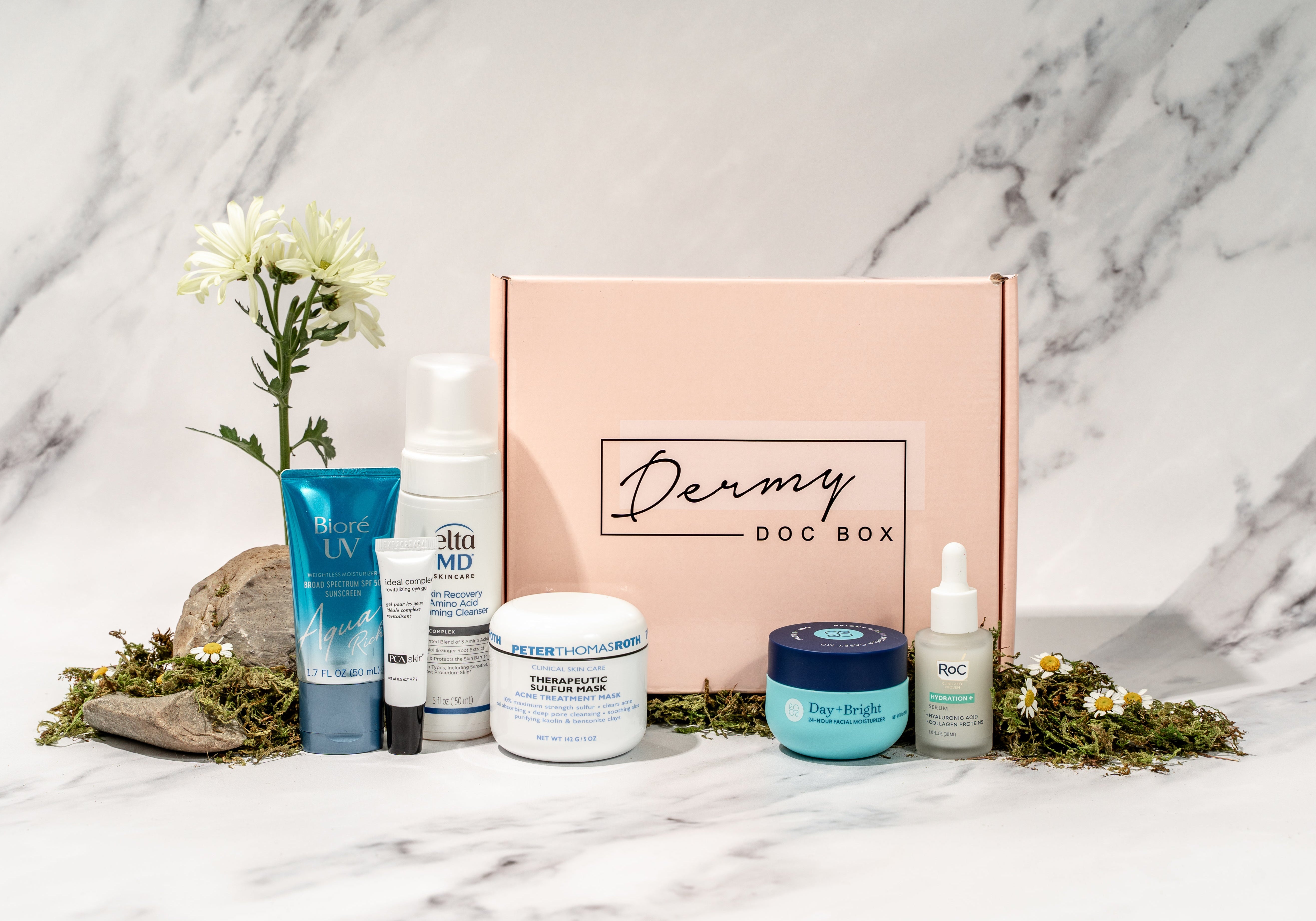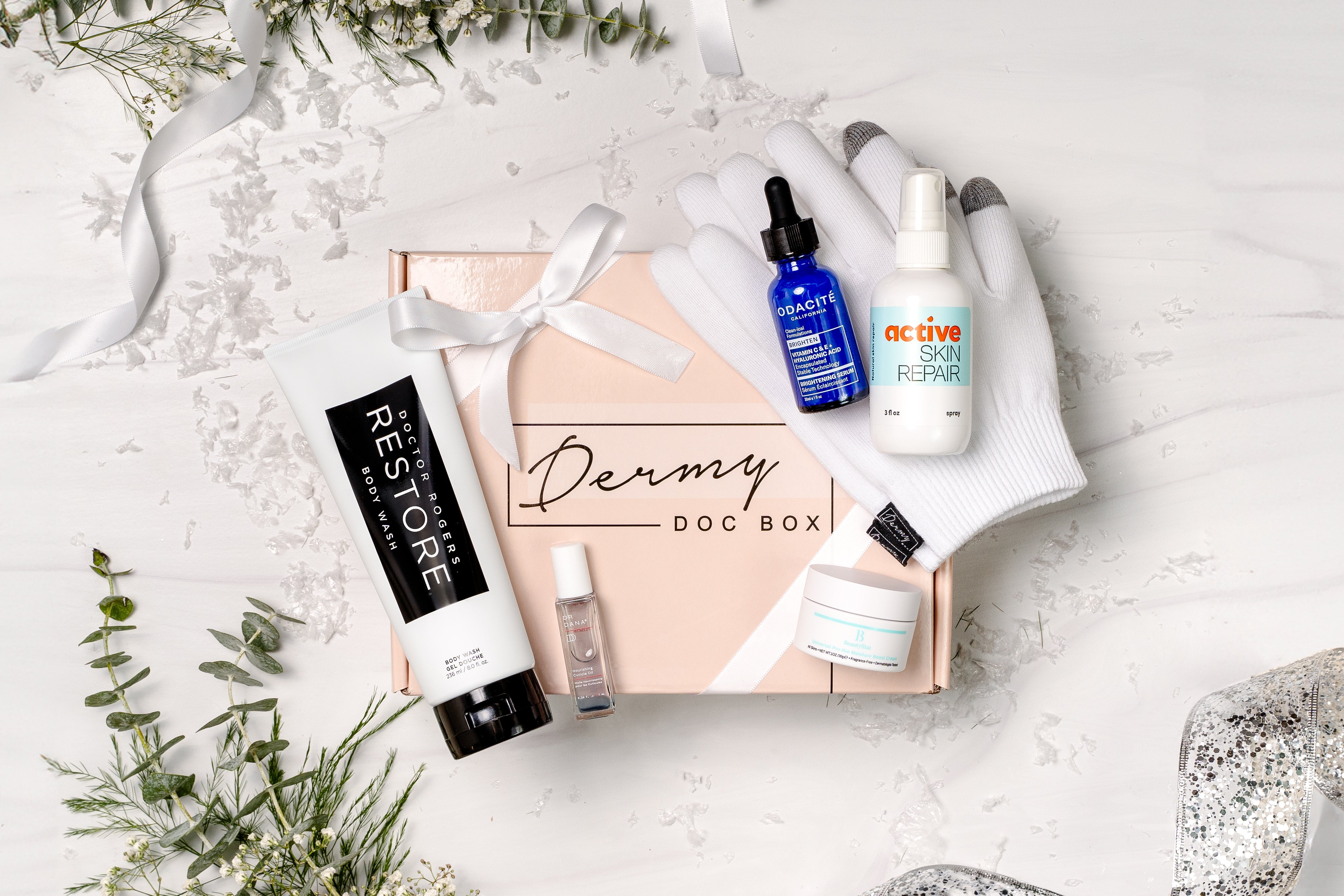How Knowing Your Skin Type Can Help You Choose Quality Products to Best Care for Your Skin
Determining your skin type is an essential step in helping you choose the best products for your skincare routine. Different products work best to address specific skin concerns. I always tell my patients, just because a product worked well for someone else, doesn’t mean it’s the best solution for you!
How are Skin Types Classified?
There are four different skin types, classified by a set of characteristics exclusive to each:
- Normal
- Oily
- Dry
- Combination
It’s important to know the difference between the characteristics of each skin type, so you can determine the best products to work well with your skin. For example, moisturizing products to treat dry skin may not be suitable for oily skin.

How to Know If You Have Normal Skin
Those with normal skin tend to have pretty clear and smooth skin, with a balance between moisture and oil production. Those with normal skin rarely experience breakouts and tend to have a nice, radiant complexion with minimal pore visibility. Lucky you!
How to Tell If You Have Oily Skin
People with oily skin tend to complain of excessive shine. This is due to the overproduction of sebum (our skin’s natural oil). Someone with an oily skin type can experience an increase in sebum production due to hormonal changes, diet, and stress. Individuals with this type of skin tend to complain of larger pore size, blackheads, and blemishes.
How to Know if You have Dry Skin
Individuals with dry skin tend to experience uneven or dull skin. Their skin feels tight and lacks elasticity. Those with dry skin may also have cracking or peeling. Fine lines tend to be more visible with this skin type.
How to Tell if You Have Combination Skin
Combination skin is the most common skin type. These individuals have both dry and oily skin so picking products can be confusing! (I also have combination skin and fit in this category.) People with combination skin have dryness along their cheeks, but complain of oily skin in the “T” zone - the forehead, nose and chin. Combination skin can feel difficult to treat as you want to control oil production and treat dryness at the same time.
Skin Care Tips for Each Skin Care Type
Every skincare type can benefit from a basic routine which includes the following:
- Cleanser
- Moisturizer
- Sunscreen (SPF 30 or higher)
- Exfoliant
- Retinoid
It’s also important to note a healthy diet full of antioxidant rich foods such as fruits and vegetables can also contribute to skin health. I also recommend drinking plenty of water, but of course, water can’t cure a skin problem.
Sunscreen
If you know me, you know that this is something I harp on all the time. Sunscreen is a non-negotiable when it comes to your skincare routine. I recommend wearing sunscreen every single day. Not only does sunscreen protect you from developing skin cancer, but it also helps to protect the skin from UVA rays which cause premature aging. I recommend choosing a broad spectrum sunscreen with SPF 30 or higher to protect against UVA and UVB rays.
Our Summer Dermy Doc Box always contains a few of my favorite sunscreens for the season! Check out last summer’s box!

Moisturizers
Keeping your skin hydrated is important for keeping your skin looking young and healthy by allowing your skin cells to function at their top performance level. Regular use of moisturizers help stall the appearance of fine lines and wrinkles in comparison to those who don’t regularly use moisturizers.
DID YOU KNOW? Dehydrated skin is more prone to irritation and infection due to a compromised skin barrier?
Types of Moisturizers
- Humectants- these moisturizers bind and hold water from the environment into the skin such as hyaluronic acid and glycerin
- Emollients- oils and lipids are emollients that create a lubricating barrier by filling in gaps between skin cells to reduce rough, flaky skin (examples include shea butter, aloe vera, and ceramides).
- Occlusives- just like the name sounds, these ingredients help trap and hold water in the skin to prevent it from evaporating off the surface (examples include: petrolatum, silicones, lanolin, and zinc oxide).
Cleansers
Cleansers help remove dirt, oil, and makeup. A gentle, moisturizing cleanser is all you need to do the trick! Types of cleansers include gel, cream, foam, oil, clay, micellar, balms, and bars.
Gel Cleansers
Gel cleansers are clear and have a gel-like consistency as the name suggests. These cleansers are designed to decongest clogged pores, remove excess oil, and kill acne-causing bacteria. I recommend gel cleansers for anyone struggling with acne-prone skin.
Cream Cleansers
Cream cleansers are lush in texture. These types of cleansers tend to be more gentle and hydrating than other types. I recommend a good cream cleanser for those with sensitive or dry skin. These work without stripping the skin of natural oils.
Foam Cleansers
Foam cleansers are great for combination skin types. These are either in gel or cream form until the user rubs them on the skin and they create a foamy rich lather. Foam cleansers help remove excess oil as well as gel cleansers. These also help remove sunscreen and layers of makeup before bed.
Oil Cleansers
Oil cleansers contain an oil base to help remove makeup and dirt on the skin without interfering with the skin’s natural barrier. Oil cleansing is a great gentle way to remove pore-clogging debris without being harsh on your skin, making it a great choice for dry skin types.
Clay Cleansers
Clay masks and clay cleansers help purify your skin by absorbing oil. These do not contain scrubs or harsh acids, making them great for sensitive and combination skin types.
Micellar Cleansers
Micellar Cleansers originated in France. These cleansers contain “micelles’ or tiny oil molecules suspended in soft water. These work by attracting oil, makeup and dirt. They are gentle enough for all skin types and one of my favorite ways to cleanse off eye makeup.
Cleansing Balms
Cleansing balms work without water to remove pore-clogging debris. Users simply apply the balm and wipe away dirt, oil, and makeup with a gentle tissue. These are very moisturizing, making them great for dry skin types.
Cleansing Bars
Cleansing bars are more gentle than traditional soaps, which can strip the skin of its natural oils. Cleansing bars will not overly dry out skin, making them a great choice for dry or combination skin types.
Exfoliating Products
Why exfoliate your skin? Exfoliating your skin on a regular basis helps remove dead skin and dirt build up, leaving you with radiant, smoother skin. Exfoliating also helps boost the absorption of your serums and moisturizers.
Did you know your skin has a natural exfoliation process? We actually shed the top layer of our skin every 28 days! Changes in weather, diet and stress can stall this process and mild exfoliation can be helpful to assist skin cell turnover.
Types of Exfoliants
- Chemical
- Physical
Chemical exfoliants are acids, such as alpha, beta and poly hydroxy acids. Common names for chemical exfoliants are glycolic acid, salicylic acid and gluconolactone.. These can be found in cleansers, powders, masks, swabs, serums and creams. Fruit enzymes are also considered chemical exfoliants from fruits like papain from papaya, bromelin from pineapple and punica granatum from pomegranate!
Physical exfoliation occurs through the use of manual abrasion on the skin with microbeads, scrubs, or cleansing brushes to break up and remove dead skin cells. The problem with this form is choosing the right type of product. Many scrubs create small tears in the skin and can cause more harm than good. There are even scrubs that contain insoluble plastic microbeads that can be harmful for the ocean and it’s animals. Motorized cleansing brushes can often cause over irritation or harbor bacteria with repeated use. When looking for a physical exfoliant, look for ones made with fine-grained crystals and avoid products with nutshells, fruit pits and plastic microbeads if possible.
Here are some top exfoliants from our previous boxes:
Yensa Pumpkin Turmeric 2-in-1 Radiance Polishing Mask
Glytone Enhance Brightening Complex
Revision Skincare Brightening Facial Wash
Defenage 2-Minute Reveal Masque

It’s important not to overdo exfoliants as you could suffer from skin redness, dryness and irritation. I recommend using exfoliants 1-3 times per week depending on what your skin tolerates
Retinoids
What are retinoids? Retinoids are Vitamin A derivatives. There are many different “types” of retinoids. Retinoic acid is prescription strength and is commonly referred to as Retina-A (aka tretinoin). Tretinoin is the ACTIVE form our skin utilizes. Synthetic precursors of retinoic acid include Tazarotene and Adapalene.
In contrast, retinols are the ingredients found in most over the counter formulations. They can require one to a few steps to be converted into the active form: retinoic acid, but have the added benefit of being less irritating (great for sensitive skin!).
Retinoids are great for all skin types, and are especially effective for oily skin. It’s a common misconception to only use a retinoid if you have mature skin, however, you can benefit from a retinoid in every decade of your life. In your 20’s retinoids help reduce acne as well as treat your oily skin. In your 30’s a retinoid helps reduce hyperpigmentation and pore size. In your 40’s and above retinoids help decrease the appearance of fine lines and wrinkles.
Remember retinoids don’t work instantly. It’s important to apply these daily for 8-12 weeks for increased cell turnover and to stimulate collagen. It’s a slow and steady process, but if you’re patient, the long term results are worth the wait!
How to use retinoids:
- Start application 2-3 times per week and increase frequency as tolerated, a pea sized amount to the entire face is all you need.
- Be careful with applying it near the eyes, around the nostrils or mouth–this skin is more sensitive and prone to irritation.
- Always wear sunscreen in the AM
- Talk to your doctor if you are pregnant or breastfeeding.
- Be consistent with use for best results.
Here are some great starter retinols:
Cerave Resurfacing Retinol Serum

Olay Regenerist Retinol + Peptide Moisturizer

Top Skincare Mistakes for Every Skin Type
Not Wearing Sunscreen
Sunscreen isn’t just meant for the beach! It’s important to apply sunscreen each morning before you head out the door. Over time sun exposure can contribute to signs of aging such as fine lines and wrinkles as well as increase your risk of skin cancer.
Look at this powerful photo of a truck driver who worked for 28 years and had constant UV exposure to one side of his face. You can see that the side exposed to his car window is significantly more wrinkled and sun damaged than the other side thanks to UVA rays that can penetrate glass windows.

(picture source: New England Journal of Medicine)
Over-exfoliating
Using a harsh acid daily or an abrasive exfoliating cleanser can result in skin irritation leading to redness, increased oil production, and acne. It’s best to limit an exfoliating treatment to 1-3 times per week. I also do not recommend scrubbing your face vigorously with a powered brush as this can cause the same issue as over-exfoliating.
Sleeping with Makeup
Even when you’re tired do not make the mistake of going to bed with your makeup on! Doing so can worsen acne and clog your pores. It’s also important to wash your pillowcase once per week as it likely harbors excess oil and bacteria that can contribute to acne.
Using too Many Products
Having a simple and effective skincare routine is important for all skin types. However, using too many products on your skin can cause irritation. There is nothing wrong with having a lot of products (I know I do!) just do not use them all at once.
Skipping a Moisturizer
Many think if you have oily skin you don’t need a moisturizer. This couldn’t be further from the truth! A great moisturizer prevents dehydrated skin. When skin is dehydrated it actually increases oil production, further exasperating the issue you’re hoping to resolve! Also note, if you suffer from acne be sure to choose a “non-comedogenic” moisturizer.
How to Choose Quality Skin Care ProductsI’ve displayed many of my favorite products on my Instagram (link) page. Choosing quality products can seem daunting with all the choices available. You’ll find many resources on my Instagram including product recommendations, videos, and posts about skin care.
My patients frequently ask me how to best care for their skin, which is why I created the Dermy Doc Box. The Dermy Doc Box is a seasonal subscription box featuring some top dermatologist recommended products for a low subscription cost. Our average box contains over $100 worth of products!
As always my main goal is to provide education and resources for those looking to put their best face forward.
Happy reading!
XOXO,







